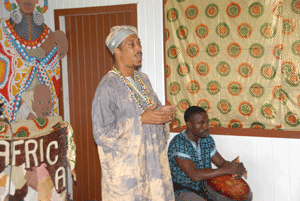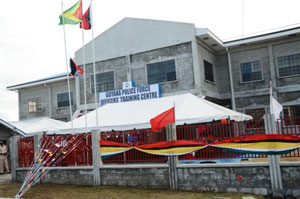COMMANDER-in-Chief of the Armed Forces, President Donald Ramotar, yesterday, scolded the Guyana Police Force (GPF) for not practising effective policing.
 Alluding to the fact that effective policing must be directly correlated to good police relations with the community, President Ramotar told ranks of the GPF that they “cannot fight crime effectively without having good relations within the communities.”
Alluding to the fact that effective policing must be directly correlated to good police relations with the community, President Ramotar told ranks of the GPF that they “cannot fight crime effectively without having good relations within the communities.”
The President said it is important that people in various communities throughout the country have confidence in the police; but this confidence comes from the Guyana Police Force, as an organisation, developing good relations with the people, projecting itself as the people’s friend who will help them to overcome difficulties and bring criminals to justice.
Mr. Ramotar was at the time addressing the opening of the $154.8M Training Centre for the Guyana Police Force at Camp Road and Young Street in Kingston, Georgetown.
Delivering the feature address, prior to unveiling the plaque signalling the formal opening of the institution, President Ramotar said he is convinced that the ordinary person would like to see all criminals brought to justice.
“If they are confident their engagement with the GPF would be kept in confidence, I am sure they would work with the police.
The police must also carry out their duties in a very even-handed manner. Too many complaints are lodged, (and) people are saying that the police are taking sides with different people, and they invariably say they can’t afford it.
“(Take) for example the noise nuisance issue: You must have heard shops blasting music into the wee hours of the morning. This is clearly against the law, but many communities still complain that nothing effective is being done (about it),” the President said.
Giving another example, he said that if, for instance, there is a wedding somewhere, the police would promptly show up at the event and take away the equipment, and people see these things as they being taken advantage of.
The President noted that the country cannot have effective policing unless the police work in an even-handed manner.
President Ramotar explained that moral values are very important, and a broad cross section of Guyanese hold to this  view, that is why it is traumatic for society to witness police officers or members of the disciplined forces being caught committing crimes, or accepting a bribe, or in any way complicit in criminal activities.
view, that is why it is traumatic for society to witness police officers or members of the disciplined forces being caught committing crimes, or accepting a bribe, or in any way complicit in criminal activities.
He said the country expects law enforcement officials to always be on the side of the law and law-abiding citizens of society, and it causes a lot of grief and harm to people’s psychology, generally, in the society when members of any branch of the disciplined forces are caught like that.
Another upsetting thing, President Ramotar mentioned, is how a number of the cases the police make are thrown out of the court, sometimes for lack of evidence, poor preparation, and other simple things which allow a lot of criminals to walk free in our society.
“I hope that with the new institution created here, along with other facilities that we have in society, it will help us to lift the quality and standard of our work, so that we would be able to prepare far better for the cases that we have in our country.”
President Ramotar pointed out that Guyanese hear about cases which have abundant evidence but persons do not show up to help prosecute the offenders. Moreover, he said, he is still struggling to understand why cases take so long to get to the courts. He said the police should be prepared to present cases in a better way.
The President also sympathised with the GPF for taking a lot of flak in the press. He said that many times that flak is uncalled for and the allegations are untrue, but often also, there are grounds for some of the criticisms in the media, and this increases responsibility on the GPF to recognise the human rights of people. President Ramotar said he suspects that a lot of attacks on the police that are used in the court are generally not true, but at times one must stand by the truth, which is often used against them.
President Ramotar said he suspects that a lot of attacks on the police that are used in the court are generally not true, but at times one must stand by the truth, which is often used against them.
The President told the gathering it is therefore important that members of the GPF observe the criticisms with a view to taking corrective action, because the GPF carries the mandate to protect the rights of people, and, in fact, each officer should ‘stand’ out in society because of their integrity and their honesty.
He encouraged members of the GPF to conduct themselves with care, because at times the public accuses the police wrongfully.
The President also highlighted concerns relative to domestic violence, stating that in most, if not all, cases that ended in death, there was a history which, had it been investigated, would have revealed that the complainants had made several reports against the perpetrators. He called on the police to investigate every matter before it ends in death, and to employ a new approach and attitude in this respect. He expressed hope that with training of GPF ranks at all levels, people would feel safe from tyrants or those who abuse them for one reason or the other.
The President also talked about child abuse and the need for the police to get involved to protect children from their abusers.
He congratulated the GPF for focusing heavily on training, and opined that ranks would also benefit from the Forensic Laboratory, so that the family members of Sheema Mangar, for instance, will not have to wait years for DNA results.
The President said he would like to see a higher level of more educated and trained GPF personnel who will be capable of dealing with any security situation that threatens the citizens of the country.
THE TRAINING CENTRE
The fully air conditioned facility boasts an auditorium with seating capacity for 230 persons, library and reading centre, cafeteria, recruitment and Information Technology centre, lecture theatres, classrooms, registrar department, storerooms and offices.
Occupying 18,320 square feet on the corners of Young and Camp Streets, Kingston, the training centre is the product of a partnership between the Inter-American Development Bank (IDB) and the Project Implementation Unit/Citizen Security Programme.
The Ministry of Home Affairs handed over the facility to the GPF yesterday, after President Donald Ramotar unveiled a plaque and toured the facility in the company of Minister of Home Affairs Clement Rohee, Acting Police Commissioner Leroy Brummell other senior officials of the force and IDB representative in Guyana Sophie Makonnen.
It is a facility which security officials are assured have created the type of environment needed to train local and foreign security personnel.
At the ceremony, President Ramotar and Minister Rohee sought to instill in officers, the importance and values of training to the security sector in Guyana, making reference to the type of security intelligence needed to address modern crimes.
The Head of State believes the force must build capacity to understand and address the transnational nature of criminal activities in the global environment like money laundering, cybercrimes and drug trafficking.
“There is a lot of inter-relationship and closeness and international crimes are a big and important factor today, and therefore it is logical that if we are going to succeed in…the goal of eliminating crime and minimising it as far as possible…we have to build new capacity in our security forces, particularly, our police men and women,” President Ramotar said.
ROGUE ELEMENTS
The conduct of officers and the few “rogue elements” that give the force a bad name were among the demerits that it is hoped will be a thing of the past as efforts continue to promote professionalism through training.
Provided that such endeavours are unsuccessful, Minister Rohee assured that the recourse to disciplinary action is always available.
Security is crucial to a country’s development and for Guyana, the perpetuation of growth and investor confidence which the country has been experiencing, particularly over the last seven consecutive years.
With training centres established in the three counties, Minister Rohee is satisfied with efforts to decentralise training of the Force at various levels and vows to continue investing in the sector despite challenges by the political Opposition in the National Assembly.
He underscored the importance of officers becoming au fait with Information Communication Technology.
“It is expected that with the quality of training at the centre, citizens of Guyana will feel the difference in the quality of service provided by the Guyana Police Force,” Minister Rohee asserted.
“The training centre has been constructed, not because training courses for officers are being conducted, but the conditions under which they were conducted were not conducive to the standard consistent with the modern police force,” he further elaborated.
Minister Rohee said the facility will be utilised to the maximum and recommended that it be used on a full time basis in the day and night because the MOHA considers training as an integral part of the modernisation thrust of the GPF.
Support from the IDB in the security sector is premised on the institution’s focus on action and prevention, and institutional strengthening programmes in Latin America and the Caribbean.
Makonnen said it is estimated that crime and violence cost economies between five and 10 percent of Gross Domestic Product (GDP).
Acting Police Commissioner Leroy Brumell also spoke at the occasion, as did Programme Coordinator of the Citizen Security Programme, Anil Ramnath; and was chaired by Permanent Secretary of the Ministry of Home Affairs, Ms Angela Johnson.



.jpg)









